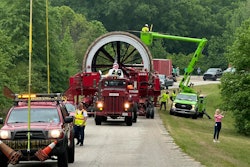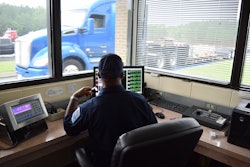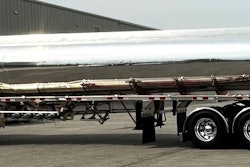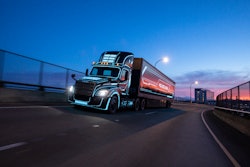Truck parking. Double brokering. A speed limiter mandate. Three issues of importance and burden, by turns, for owner-operators rose to the forefront at a House Committee on Transportation & Infrastructure hearing Wednesday.
Focused broadly on "Overcoming Supply Chain Challenges to Deliver for America," the hearing saw representatives from the Owner-Operator Independent Drivers Association, the Transportation Intermediaries Association, America's truck stops and fuel makers, and the Teamsters sound off on the big issues impacting various trucking constituencies today.
If the recent EPA hearings on the new Phase 3 emissions regulations largely served as a sounding board for environmental groups to urge stricter rules, this hearing was a response from trucking groups, and even House Reps, taking the Biden administration to task.
Highways and Transit subcommittee chair Rick Crawford (R-Arkansas) praised the essential role of truck drivers in the economy and blasted "Soviet-style empty store shelves" and other supply chain failures during the pandemic.
"At a time of sky-high fuel prices while most work remotely," said Crawford, "the administration continues to prioritize their ideology" to "essentially outlaw diesel trucks" while pushing electric trucks that "the market is not ready for." Crawford cited the weight of electric trucks, their cost, their intense mineral needs and how they don't pay into highway use tax schemes as making the pursuit of electric trucking "crazy and unrealistic."

[Related: CARB playing hardball: Board votes to ban diesel sales in California in 2036]
OOIDA Executive VP Lewie Pugh introduced testimony that some have used "Washington’s recent focus" on supply chain struggles "to portray or recast self-serving policies as supply chain improvements."
Pugh, who drove a truck for 23 years and logged 2.5 million safe miles, cited firsthand experience with the major issues of truck parking, detention time, and issues caused by speed limiters.
"I strongly encourage you to listen to the men and women on the road every day," he said. "Unfortunately, ask any trucker. They say their needs and concerns have fallen to the lowest priority among workers in the supply chain."
Pugh stressed the income and productivity losses drivers face due to parking shortages, likewise wages stagnating and falling against inflation since the 1970s.
[Related: How to fight for your right to park the truck]
"Never before has more regulation been imposed on truckers, and truckers are complying at extremely high rates, yet crash rates continue to increase," he said, pivoting to the issue of speed limiters. "Despite no requirement to do so, this administration is moving forward with the extremely unpopular speed limiter mandate that will slow the movement of freight, increase crash rates, and worsen driver recruiting and retention."
In response to committee questioning, Pugh described "turtle races" between limited trucks causing congestion, and the technical difficulties of speed-limited trucks with different weights and performance profiles all governed to a single "one size fits all" speed.
Asked point blank what the worst regulation was in terms of inhibiting the supply chain, Pugh said speed limiters.
[Related: Speed limiters: How fast is too fast?]
"I get all the time from the agency that they want to hear from truck drivers," Pugh said. "When they came out with [the speed limiter mandate proposal], they received 16,000 comments, with the vast, vast majority against it, but they're still moving forward. I talk to drivers who say 'we don't interact with the government because why bother, they don't listen anyway.'"
Just last week, legislation was introduced in the house that would prohibit the FMCSA from moving forward with a speed limiter mandate. Pugh said that other legislative levers could be pulled to incentivize drivers not to speed, like removing the trucking exemption from the Fair Labor Standards Act of 1938 to put more pressure on shippers/receivers to load and unload trailers in a timely fashion to minimize overtime due.
Representative Brandon Williams (R-New York) suggested that truck drivers, with their long, uncompensated hours, act as a "buffer" in the supply chain. "Drivers are being used, maybe even abused, not because it's best for the supply chain, not because it helps us move in the best manner, but because there's no cost," he said. "But there is a human cost."
"The same people pushing for speed limiters are the same people against paying truckers overtime," said Pugh. "If you paid a trucker by the mile and have some crazy concern that truckers are flying down the highway, probably paying them by the hour and paying them overtime would automatically put them where they should be going, if that’s what you’re trying to get at."
On the topic of detention time and trucker access to bathrooms, which a different bill currently in the House would mandate, Pugh asked Congress to step into the driver's shoes. "I’d actually like to see you or your colleagues get any work done if you didn’t have a safe place to rest at night," he said, "if you showed up here for work at 9 a.m. and weren’t allowed to do anything until early afternoon all while not being allowed to use the restroom or being paid for that time you wasted."
Anne Reinke, President and Chief Executive Officer with broker group TIA, pointed to "potential pragmatic solutions" to improve trucking work and remove what she described as a "fraud epidemic" in the industry.
Reinke noted the number of brokers had climbed 33% from 2020 to 2022, and that "today brokers handle about 30% of freight in the supply chain, and it's anticipated to grow to 45% by 2045."
The problem, as she put it, was that truck crash rates over that time had risen and that "most trucking companies fail to receive a compliance and safety audit, leading to 92% of carriers being unrated" in the federal safety rating system.
[Related: 'Fit or unfit': FMCSA keying in on problems with 'Conditional' safety rating limbo]
"Today's physical audits on trucking companies are outdated, ineffective, and resource-constrained," she said, adding that the understaffed FMCSA slowed down physical inspections in the pandemic, and never seems to have picked back up. Brokers themselves, of course, don't get much of any kind of audits, and many in the trucking industry have reported an increase in freight fraud and so-called "chameleon carriers."
This, according to Reinke, has led to a "fraud epidemic in the supply chain which interrupts the safe chain of custody of the nation's freight and is estimated to cost brokers, carriers, shippers, and consumers around $800 million or more," each year.
TIA worked with the government in on the 2012 MAP-21 infrastructure bill and its broker provisions to "codify legal brokerages" and institute a $10,000 penalty for illegal activity, as well as launching a National Consumer Complaint Database to report fraud cases.
"Unfortunately, due to a lack of enforcement, there’s a proliferation of bad actors in the supply chain illegally brokering freight, registering as carriers with hundreds of different MC numbers and conducting outright freight theft and holding freight hostage." she said. "Today there are over 80,000 complaints in the database that were never investigated and no penalties have ever been assessed."
Furthermore, "unlicensed and unregistered dispatch services" may "often broker freight without authority, and even handle sensitive government freight while they may not even be domiciled in the U.S."
Overdrive investigations into recent allegations of freight fraud sometimes lead to what to appear to be overseas actors, likewise with broker authorities in the federal system involved.
When Reinke was asked about the worst regulation hurting trucking, she didn't name one, rather urged great enforcement of "the regulations they already have." She called on the FMCSA to do more to enforce penalties carrier and broker authorities engaged in fraudulent double brokering and other practices.
Other speakers at the hearing, like David Fialkov, an executive government affairs VP representing the nation's truck stops and fuel makers, spoke to questions about the wisdom of an accelerated push towards electrification in trucking. While truck stops "don't care" what fuel people buy, much like they wouldn't care if you buy Coca-Cola or Pepsi, he said they "can't identify a viable business case for installing EV charging infrastructure."
[Related: 'Destined to fail': Trucking sounds off on EPA's new Phase 3 emissions regs]









